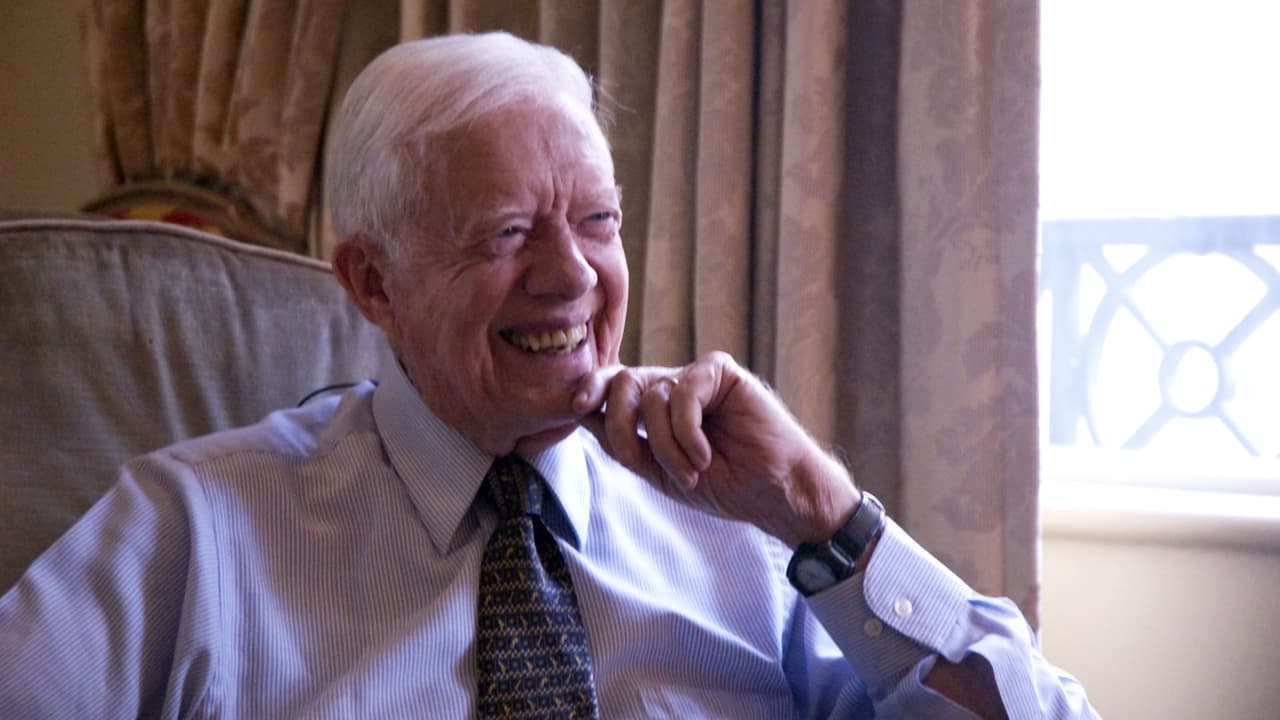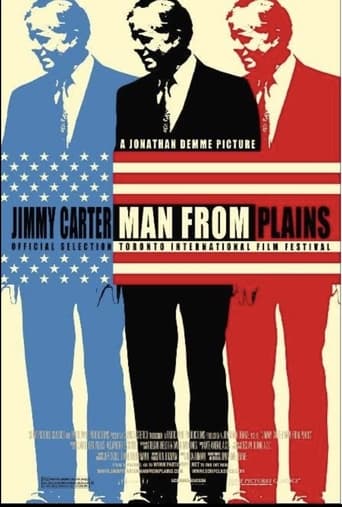

An action-packed slog
... View MoreIn truth, there is barely enough story here to make a film.
... View Moreit is the rare 'crazy' movie that actually has something to say.
... View MoreThis film is so real. It treats its characters with so much care and sensitivity.
... View MoreAlthough entertaining, this movie approaches current events with a depth rarely seen in American media.The filmmakers followed Carter on a book signing tour after he challenged to current mythology that Israel is always right. They use the tension provided as people, most who haven't read the book, attack.The book was titled, Palestine: Peace or Apartheid. The movie could have been titled Carter: Man of Peace. His efforts to bring peace to the world and the way he embodies peacemaking in his daily life were moving.One of the most telling scenes is in the extra footage included with the DVD. A woman waits in a long book-signing line to tell President Carter she thinks he should be tried as a traitor. The look on her face and her obvious lack a clue what to do next when he responds quietly and moderately and moves on, is classic. (I wonder if the producers would cut it differently after the success of those Borat movies in which people didn't mind looking stupid as long as they got attention.)
... View MoreI've long felt that Mr Carter is most likely the greatest man to ever occupy the White House. This film reinforced that. I've long been a staunch advocate of Israel and the right of Israel to protect itself. This movie (and the book around which it revolves) did nothing to change that. What did change, what I found really embarrassing was the behavior of the advocates of Israel shown in this film. I say this as someone who lost a close friendship with an Arab over an on-going argument regarding Israel when I quoted Golda Meir: There will only be peace when they love their children more than they hate us. But it goes both ways.President Carter reminds us that, in order to seek peace, we must take risks and have open minds, open arms and open hearts. The "pro-Israeli" protesters and interviewees in this film seem to care nothing about ending the nonsense that has touched every single Israeli and Palestinian Arab family over these past 60 years. If seeing and listening to President Carter hadn't been such a thrill, I might have left this film with great disdain for these opponents of peace. Instead, I feel as though I was allowed a two hour glimpse at the greatness of a man who will never be appreciated appropriately in history books. He's an incredible man. What prevents me from giving this a ten is that the editing and direction of this film were far from incredible.
... View MoreDepending on your political proclivities, those expecting a full-blown biopic of the 39th President of the United States will be either severely disappointed that it focuses primarily on his 2006/7 book signing tour, or exhilarated that it is not a two-hour Biography Channel special of his life's highlights. Filmmaker Jonathan Demme ("Silence of the Lambs", "Philadelphia") is no stranger to the demands of the documentary format, although his previous efforts have been concert films, 1984's "Stop Making Sense" with the Talking Heads and 1998's "Storefront Hitchcock" with English singer Robyn Hitchcock. This time, he and cinematographer Declan Quinn followed Jimmy Carter, spry and fit for 83, on his extensive tour to promote his controversial 2006 bestseller, "Palestine: Peace Not Apartheid" about the indignities faced by Palestinians living in the Occupied West Bank and Gaza Strip. The book's deliberately provocative title was designed to spark discussion, and the thrust of the 2007 film is to show the media-intensified firestorm Carter faced as a result.To his immense credit, Demme lets Carter speak for himself in the film and doesn't allow a narrator to provide color commentary on the former president's hectic touring schedule. What comes across is a man rightfully proud of the 1978 Camp David Accords between Israel and Egypt, and has most recently taken to heart his sense of responsibility as a private citizen and former leader to share the devastation he has seen the Palestinians experience in the occupied areas cut off from the rest of the world. It's an arc that Demme explores through an effective use of archival footage, interviews with key figures (including Carter's wife of 62 years, Rosalynn, who speaks movingly about what led Menachem Begin to sign the final treaty), and the robust, even-keeled presence Carter maintains throughout despite what seems to be a dizzying pace and the consistent critical onslaught. Much of Carter's politic demeanor can be attributed to his faith, including nightly Bible readings with Rosalynn (no matter where he is), but Demme also shows the discipline Carter employs with his handlers and in his regular regimen of swimming laps.It's definitely a favorable impression of the former president, which is unlikely to sit well with detractors who view him as a treasonous rabble-rouser, but the effect is understandable given that some of Carter's more vocal opponents refused to be filmed, including Dr. Kenneth Stein, who resigned as a Carter Center fellow (of whom Carter dismissed as an absentee member), and a roomful of protesting rabbi elders in Phoenix. Fortunately, renowned Harvard professor and attorney Alan Dershowitz is included as one of the most vocal opponents of Carter's book. His fair-minded comments provide a critical counterbalance to the positive image of Carter, and interestingly, it is never really explained why Carter would not face Dershowitz in a public debate at Brandeis University, who initially turned down Carter's proposal to lecture for free. Intriguingly, Demme takes a behind-the-scenes approach to the various media interviews, whether it's Terry Gross, Charlie Rose, Wolf Blitzer, or Tavis Smiley. In turn, Carter expertly modulates his points to fit the format, including an amusingly deadpan confession to Jay Leno on who really wears the pants in the Carter marriage.Demme also incorporates the other key priorities in Carter's life to provide more dimension to the portrait - his dedicated work on Habitat for Humanity and as caretaker of the land his family has owned for nearly two centuries around Plains. The parts of the film that drag unnecessarily are more logistical in nature traveling repeatedly with his kowtowing Simon & Schuster publicist and preparing the customers for the book signings. At 125 minutes, the film runs a mite long and could have benefited from another editing session. Extras are plentiful on the 2008 DVD starting with over thirty minutes of additional scenes and a half-hour featurette on the making of the soundtrack. Neither feels essential though an extended sequence showing a signing at Costco brought out a perturbed woman who tersely told Carter he should be tried for treason. Demme and producer Neda Armian also contribute a very thoughtful commentary track. Trailers for ten other Sony Classics films on DVD complete the extras.
... View MoreJonathan Demme makes a misstep in this documentary with the former president. I believe that Jimmy Carter's advocacy of peace is sincere. But this film in support of the controversial book does nothing to advocate his position nor incite any discussion.Demme's film leaves us with no legacy or message. We simply aren't provided enough content to understand the former president's position. Over two hours was spent watching Carter enter and exit limousines and hotel rooms. More time is spent watching Cater sign books than explaining the controversial Palestinian policies.Former Vice President, Al Gore, made complex facts simple and digestible in his film. Unfortunately, President Carter made a complex situation and the associated politics even more distant. Carter and Demme, both articulate men, did not get a message across. Don't waste your time.
... View More